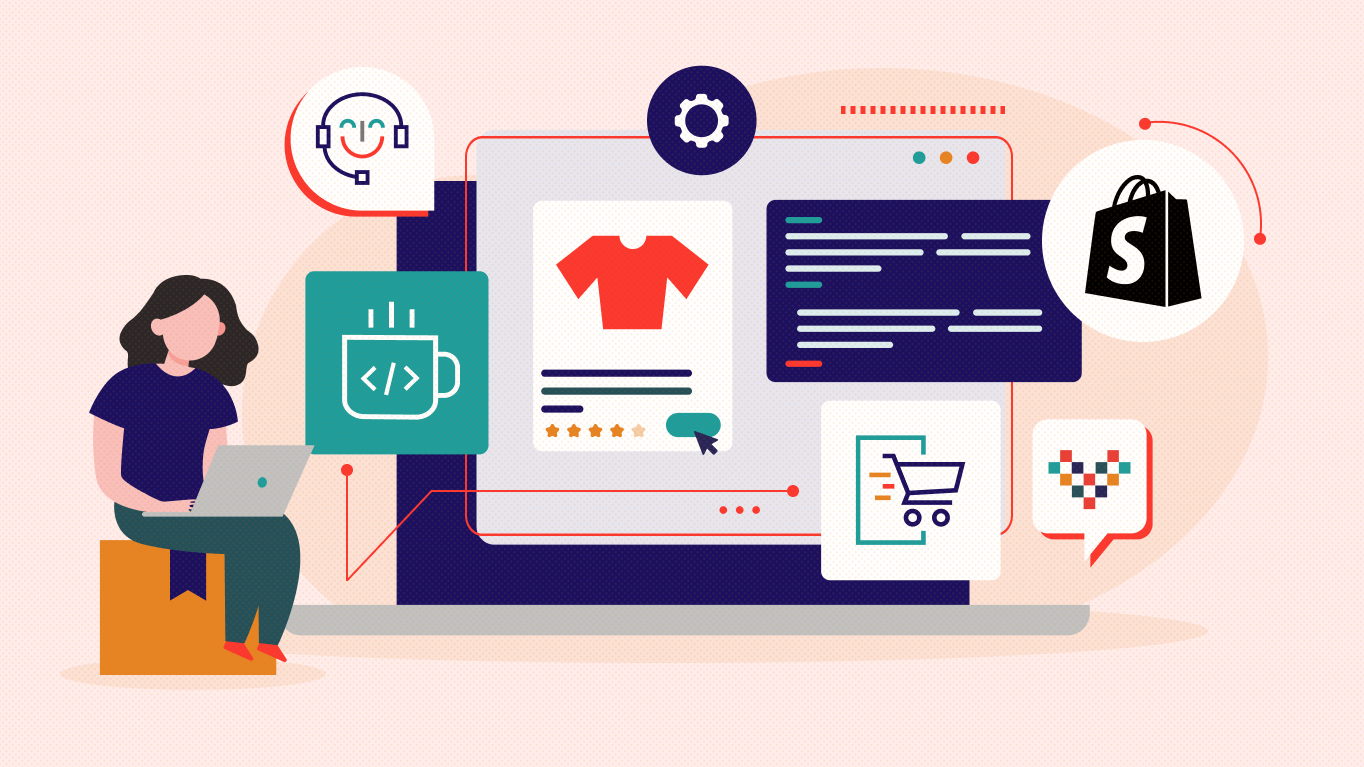Shopify Custom Applications: A Powerful E-Commerce Solution for Manufacturers and Retailers

Enterprise Resource Planning (ERP) systems like Microsoft Business Central or S/4HANA are the backbone of large manufacturing and distributing companies. However, integrating these systems with e-commerce platforms like Shopify can be challenging sometimes, due to unique business needs and complex workflows. Indeed, despite having pre-built connectors that offer basic functionality, ERP systems may not cater to the intricate workflows of large manufacturers and distributors. And this is precisely where custom apps come into play, offering tailor-made solutions that can take ERP and Shopify integration to the next level!
Here's how Shopify custom applications can help you meet your e-commerce needs (even the most complex!)
3 Examples of Use Cases for Custom Apps
1. Advanced Automated Order Processing
Large distribution companies may have intricate order processing workflows, involving multiple departments or locations. Having to deal with large and complex product catalogs and multi-warehouse distribution systems, these companies often end up processing orders manually at some point, which can lead to inaccuracies in inventory data, resulting in stock-outs or overselling. Additionally, order fulfilment across multiple warehouses is often time-consuming and potentially error-prone.
Fortunately, custom applications come with features that can help you process your order flow more efficiently:
- Real-Time Inventory Sync: The custom app establishes a real-time connection between Shopify and the ERP. Whenever a customer places an order on the Shopify store, the app checks the ERP for accurate stock levels across all warehouses.
- Automated Order Routing: Based on pre-defined rules within the custom app, the order is automatically routed to the warehouse with the optimal stock availability. Factors like shipping distance to the customer and fulfillment speed can be considered.
- Automated Picking and Packing: The custom app transmits order details directly to the ERP, triggering the picking and packing process in the designated warehouse. Warehouse personnel can access digital pick lists generated by the ERP, minimizing picking errors.
- Automated Shipping Label Creation: Once the order is picked and packed, the custom app retrieves shipping information from the customer's order and automatically generates shipping labels within the ERP. This eliminates manual data entry and ensures accurate shipping information.
- Inventory Update and Order Status Update: After shipment, the custom app updates the ERP inventory levels and sends confirmation to Shopify. This ensures the Shopify store reflects accurate stock availability for future customers.
- Customer Notifications: Throughout the process, the custom app triggers automated email notifications to the customer. These can include order confirmation, shipment notification with tracking details, and estimated delivery date.
Benefits
- Increased Efficiency: Manual data entry is eliminated, saving significant time and reducing errors.
- Improved Accuracy: Real-time inventory data ensures accurate product availability information.
- Faster Order Fulfillment: Automated order routing and picking processes expedite order fulfillment.
- Reduced Costs: Streamlined workflows minimize labor costs and potential fulfillment errors.
- Enhanced Customer Experience: Automated communication keeps customers informed throughout the process.
These are just a few of many examples of how Shopify Custom Apps can positively transform complex order processing workflows for large manufacturing and distribution companies.
2. Boosting Customer Service
Companies often have a separate, isolated customer relationship management (CRM) system to manage customer interactions. They may even have many, requiring Customer Service Representative to login to different systems just to answer one single customer question. They consequently struggle to provide a simple and seamless customer experience. And Sales representatives lack real-time access to customer purchase history and preferences, hindering personalized service.
Now, imagine being able to rely on a Custom App that bridges the gap between your Shopify store and your (most probably) Salesforce CRM platform, thanks to several features:
- Unified Customer Profile: The custom app creates a unified customer profile within the Shopify admin interface. This profile aggregates customer data from both Shopify (purchase history, order details) and the CRM (communication history, preferences).
- Real-Time Order Status and Tracking: Sales associates have real-time access to order status and tracking information directly within the Shopify admin. This allows them to answer customer inquiries about order status promptly and accurately.
- Personalized Product Recommendations: Leveraging purchase history data from the CRM, the custom app can suggest relevant products to customers based on their past purchases and browsing behavior. This personalization can be displayed within the Shopify store or used by sales associates during live chat interactions.
- Automated Order Recommendations: The custom app can analyze past purchase data and suggest add-on items or complementary products during checkout. This upselling and cross-selling tactic can increase average order value.
- Streamlined Returns and Exchanges: The custom app allows customers to initiate return or exchange requests directly through the Shopify store. The request is automatically logged within the CRM, and relevant information (order details, reason for return) is readily available to customer service representatives.
- Improved Post-Purchase Communication: Based on purchase data and interactions, the custom app can trigger automated post-purchase emails. These emails could request product reviews, offer personalized advice, or inform customers about upcoming sales on similar products.
Benefits
- Personalized Customer Service: Sales associates have access to a complete customer profile, enabling them to provide more personalized and relevant interactions.
- Increased Customer Satisfaction: Faster response times, accurate information, and personalized recommendations lead to a more positive customer experience.
- Improved Sales Efficiency: Sales associates have access to valuable customer data and tools to promote upselling and cross-selling, increasing average order value.
- Streamlined Returns and Exchanges: Automated processes make returns and exchanges easier for customers and less time-consuming for customer service representatives.
- Enhanced Customer Loyalty: Personalized post-purchase communication fosters customer engagement and loyalty.
This example demonstrates how a custom app can transform customer service for online retailers by integrating CRM data directly into the Shopify admin interface. By providing sales representatives with a holistic view of each customer, the custom app empowers them to deliver a personalized and efficient shopping experience.
3. Product Data Enrichment
Having a catalog with rich data is key to the success of many online retailers. It’s how some of them can distinguish themselves from competitors. Materials, specifications, sizing charts, care instructions are all looked for by shoppers. Whether your Product Data resides within an ERP or a Product Information Management (PIM) system, the efforts to keep it updated, rich and consistent across all channels frequently involves a time-consuming manual process, a process that is prone to errors. That is why many PIM providers offer off-the-shelves connectors to Shopify. But sometimes, a Custom App is the most relevant solution.
Here are some examples of features where Shopify custom apps can help:
- Streamlined Product Upload: The custom app allows for bulk uploading of product information directly from the PIM system into Shopify. This eliminates the need for manual data entry in Shopify, saving significant time and resources.
- Automated Data Mapping: The custom app can be configured to map specific data points from the PIM system to the appropriate fields within Shopify. This ensures consistent and accurate product information across all platforms.
- Enhanced Product Descriptions: The custom app can pull detailed descriptions, including technical specifications, care instructions, and usage tips, from the enriched data within the PIM system. This empowers your company to provide customers with comprehensive information, leading to more informed purchase decisions.
- Rich Media Integration: The custom app facilitates the seamless integration of high-resolution images, product videos, and 360-degree product views from the PIM system into the Shopify store. This creates a more engaging and informative shopping experience for customers.
- Synchronized Product Updates: Whenever product information is updated within the PIM system (e.g., material changes, new size availability), the custom app automatically pushes the updates to Shopify, ensuring consistent product information across all channels.
- Multilingual and Multi-Currency Support: The Custom App can be configured to display product information in various languages and currencies based on customer location and preference. This caters to your company’s potential for international expansion.
Benefits
- Improved Data Accuracy: Eliminating manual data entry minimizes the risk of errors and ensures consistent product information across all platforms.
- Enhanced Customer Experience: Rich product descriptions, high-quality visuals, and multilingual support create a more informative and engaging shopping experience.
- Increased Efficiency: Streamlined product uploading and automated data updates save significant time and resources for product management teams.
- Improved Search Engine Optimization: Comprehensive and accurate product data enhances search engine ranking for your organization’s products.
- Scalability for Growth: The custom app can allow your organization to easily add new products and manage a growing inventory within the PIM system and have it automatically reflected in their Shopify store.
This example showcases how a custom app can bridge the gap between a Shopify store and a PIM system. By automating data transfer and ensuring consistent product information across platforms, it can empower your organization to deliver a superior customer experience while streamlining their product management processes.
What About Return-on-Investment?
While Shopify boasts an extensive ecosystem of third-party apps unmatched by competitors, these off-the-shelf solutions can fall short in accommodating the intricate business requirements commonly encountered by large enterprises. Despite lower initial costs, their rigidity hinders adaptability to unique organizational needs. Conversely, investing in a custom-built app may demand a higher upfront expenditure, yet it promises long-term cost efficiencies through streamlined operations and the elimination of labor-intensive manual processes.
For instance, if a company spends $20,000 annually on manual data entry and a custom app can automate this process, the app would pay for itself in a few years, even if its development cost is $50,000.
Custom Apps vs. Off-the-Shelf Solutions
While custom apps offer undeniable advantages, cost is a major concern. Here's a breakdown to help you decide:
Custom App Development
Costs can vary depending on the complexity of the app and the developer's experience. Expect an initial investment ranging from $10,000 to $50,000+. However, this is a one-time cost, and the app can scale with your business needs.
Off-the-Shelf Connectors
These are typically less expensive, with monthly subscription fees ranging from $30 to $200+. However, they may have limited functionality and struggle to address complex workflows. So you might end up not automating your operational processes at all.
iPaaS Integrations
These offer more flexibility than off-the-shelf connectors but may still require customization for specific needs. Costs can range from $500 to $2,000+ per month, depending on usage.
Although the upfront costs for a custom application may seem substantial, the long-term advantages warrant careful consideration. By enhancing operational proficiency, minimizing errors, elevating customer satisfaction levels, and enabling seamless business scalability, a purpose-built solution promises a robust return on investment (ROI) that justifies the initial financial commitment.
Your e-commerce needs, our priority
Let's make your e-commerce project a reality!
